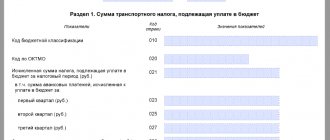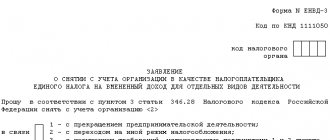Apply for participation in the online seminar →
During the period of relative calm between annual and quarterly reports, it is time to brush up on your knowledge of submitting amended declarations. Do you think it's a waste of time? You know absolutely everything about clarifications, and there’s nothing to talk about here? Let's check it out!
In the article you will find useful information about updated declarations, you will be able to make a “snapshot” of your knowledge in a couple of minutes, and you will also receive an important hint with which working with updates will become easier for you and safer for the company.
Clarification with the amount of tax to increase
If you submit a “clarification” due to the fact that you previously underestimated the tax amount, then this “clarification” will increase the tax amount. However, such a “clarification” in itself is not yet a basis for collecting a fine from you under paragraph 1 of Article 122 of the Tax Code of the Russian Federation.
note
In a special position regarding the verification, there are “clarifications” with the amount of VAT to be reimbursed (Articles 176, 176.1 of the Tax Code of the Russian Federation). An independent “camera examination” is always carried out on such a declaration, even if it was submitted during an on-site verification.
Let us recall that, according to this provision, non-payment or incomplete payment of tax amounts as a result of underestimation of the tax base or other incorrect calculation of tax entails a fine in the amount of 20 percent of the unpaid tax amount. However, to do this, the tax authorities still have to prove the fact of underestimation of the base and the presence of arrears. They do not have the right to simply charge a fine for the amount of the difference between the initial declaration and the “clarification” (letter of the Ministry of Finance dated 02/04/2013 No. 03-02-07/1/2279; resolution of the Federal Antimonopoly Service of the North-West District dated 01/21/2014 No. A05-1380/2013).
In particular, this means that the accrual of a fine is unlawful if you have an overpayment of taxes that occurred before the period being adjusted. In this case, there is no debt to the budget, and tax authorities have the right to independently offset the overpayment against the underpaid amount of tax (clause 20 of the resolution of the Plenum of the Supreme Arbitration Court of the Russian Federation dated July 30, 2013 No. 57).
In addition, even if you do not overpay, you can avoid a fine if (clauses 3, 4 of Article 81 of the Tax Code of the Russian Federation):
- submit the “clarification” before you learn that the tax authorities have discovered an error or that an on-site audit has been scheduled for you for the period in which the tax was underestimated;
- pay the missing amount of tax and the corresponding penalties before submitting the “clarification”.
Significance of the dispute for taxpayers
In the case under consideration, the court pointed out the need to apply the criterion of reasonableness when ordering an on-site inspection after filing an updated declaration. However, the court did not formulate any algorithm for determining the reasonableness of the period.
The relevant criteria are likely to be developed as specific disputes are considered. We will monitor the development of judicial practice on this issue.
In any case, based on this approach of the Supreme Court, the taxpayer, in respect of whom an audit was ordered after filing an updated return, has the right to apply to the court in order to verify the reasonableness of the period for conducting such an audit.
Clarification during desk check
Tax authorities conduct a desk audit in relation to each declaration that they receive. They do not need to make any decision for this. The period of such verification is 3 months. After this time, tax officials must draw up a desk audit report recording its results, but only if any violations are identified. If the declaration does not raise any questions, there will be no act (clause 5 of Article 88 of the Tax Code of the Russian Federation; clause 1 of the Federal Tax Service letter No. ED-18-15/1693 dated December 18, 2014).
During the camera meeting, you may be sent a request to provide explanations and make corrections (clause 3 of Article 88 of the Tax Code of the Russian Federation, Appendix No. 1 to the order of the Federal Tax Service of Russia dated May 8, 2015 No. ММВ-7-2 / [email protected] ). This requirement does not mean that you must pass the “clarification” test. If you are confident in the data reflected in the declaration, simply provide written explanations of where such figures come from. If there is an understanding that the indicators really need to be corrected, “clarification” will be required. If the corrections are related to an understatement of the tax amount, before submitting the “clarification”, pay the tax and penalties. As already mentioned, the document recording the violations that were identified during the “camera camera” is the inspection report. Therefore, tax authorities cannot fine you for errors corrected before drawing up such an act, subject to additional payment of tax and penalties.
Moreover, having received the “clarification” before the expiration of 3 months, tax authorities must stop all actions to verify the initial declaration and begin checking the “clarification”. Similarly, the Federal Tax Service recommends not drawing up an audit report (not serving it) if the “clarification” is submitted before the office report is delivered to the taxpayer. Unless, of course, we are talking about checking the declaration with the amount of VAT to be reimbursed (clause 3 of the Federal Tax Service letter dated November 21, 2012 No. AS-4-2 / [email protected] ).
But there is no particular point in submitting a “clarification” after the desk inspection report has been delivered. According to the Federal Tax Service, such a “clarification” no longer affects the consideration of materials from checking the initial declaration and making a decision based on its results (letter of the Federal Tax Service of Russia dated November 20, 2015 No. ED-4-15/20327). And judicial practice on this matter is contradictory. Some courts indicate that the “chamber room” ends only with the adoption of the final decision. And if before such a decision is made, a “clarification” is submitted, the verification of the initial declaration must stop (Resolution of the Federal Antimonopoly Service of the North-West District dated January 14, 2013 No. A81-1421/2012). However, others point out that this interpretation allows the taxpayer to avoid liability for violations identified by the audit by simply paying additional taxes and penalties accrued in the act and submitting a “clarification” before the final decision is made (FAS Resolution UO dated April 4, 2013 No. F09-2044/13).
Will the updated declaration affect the result of the audit?
If, during or after a tax audit, an organization submits updated returns, then in what order should tax authorities take into account the new data when making a decision based on the results of the audit? The Federal Tax Service has instructed its subordinate structures. Their actions will depend on the time of filing the updated declaration. The clarifications are also useful for taxpayers.
LETTER OF THE FEDERAL TAX SERVICE dated November 21, 2012 No. AS-4-2/19576 ABOUT SOME ISSUES RELATED TO ACCOUNTING UPDATED TAX DECLARATIONS WHEN MAKING DECISIONS ON THE RESULTS OF A TAX AUDIT, REFLECT Identified VIOLATIONS IN NO DECLARATION NEEDED
Having analyzed the provisions of paragraph 1 of Article 81 of the Tax Code of the Russian Federation, tax specialists noted in the commented letter that the Tax Code does not establish the right or obligation of the taxpayer to submit an updated declaration on violations identified by the tax authority. To substantiate their position, they referred to the rules for filling out specific declarations (clause 2 of the Procedure for filling out a tax return for value added tax, approved by order of the Ministry of Finance of Russia dated October 15, 2009 No. 104n, clause 3.2 of the Procedure for filling out a tax return for corporate income tax, approved by order of the Federal Tax Service of Russia dated March 22, 2012 No. ММВ-7-3/174). They provide that when a taxpayer (tax agent) recalculates tax amounts, the results of tax audits for the period for which the taxpayer (tax agent) recalculates tax amounts are not taken into account. There is no point in submitting an updated declaration reflecting additional charges specified in the documents drawn up based on the results of the audit (in an act, decision), since the tax authority already has this data. For an accountant, this is extra work. But the accountant is obliged to make the necessary corrections in accounting. At the same time, the phrase contained in the act and the decision to hold (refuse to hold) accountable for committing a tax offense about the need to make corrections in the accounting and tax accounting documents does not mean the obligation to submit a “clarification”, since the declaration does not relate to tax accounting documents. It represents a taxpayer’s statement about the objects of taxation, about income received and expenses incurred, about sources of income, about the tax base, tax benefits, about the calculated amount of tax and (or) about other data that serves as the basis for the calculation and payment of specific taxes (clause 1 Article 80 of the Tax Code of the Russian Federation). This is precisely the opinion of tax service specialists in the commentary letter. A similar point of view (that in the updated declaration the taxpayer does not take into account the decision of the tax authority based on the results of the on-site tax audit) is given in the letter of the Federal Tax Service of Russia for Moscow dated April 13, 2010 No. 16-15/038583. The judges also believe that the taxpayer’s obligation to submit an updated declaration in such a situation is not provided for by law. That is, if an error in reporting (a contradiction or inconsistency of data) was noticed by the inspectors themselves during an on-site inspection, then they must, as a result of the inspection, correctly determine the amount of actual tax liabilities (Resolution of the Federal Antimonopoly Service of the North-Western District dated December 8, 2009 No. A56-14285/2009 ). Please note that if the correction of errors for one tax necessitates a recalculation of the tax base for other taxes that were not the subject of the audit, then the company (even if these other taxes were not underestimated) can submit updated declarations on the basis of paragraph 1 of Article 81 of the Tax Code RF. And the tax authority has no right to refuse to accept them (clause 4 of Article 80 of the Tax Code of the Russian Federation). The tax authority itself does not have the right to recalculate, based on the results of an audit, those taxes that were not audited. If these taxes turn out to be underestimated, the taxpayer is obliged to submit updated declarations for them (clause 1, article 54, clause 1, article 81 of the Tax Code of the Russian Federation). Let us recall that when errors (distortions) made led to excessive payment of tax, the organization has the right not to submit a “clarification”, but to recalculate the tax during the period when errors (distortions) relating to previous periods are identified (clause 1 of Article 54 of the Tax Code of the Russian Federation, letters of the Ministry of Finance of Russia dated 05.12.10 No. 03-03-06/1/322, dated 03.29.10 No. 03-02-07/1-131). THEN CANNOT BE REFUSED TO ACCEPT A DECLARATION
Since we are talking about clarifications related specifically to the inspection, we note two more important points. Firstly, the Tax Code does not prohibit the submission of updated returns for the corresponding tax period in the event of the appointment, conduct or completion of an audit. There is no prohibition on submitting an updated declaration even after a decision has been made based on the results of the audit. Consequently, the taxpayer’s right to submit an updated return must correspond to the authority of the tax authority to verify it. This is indicated in the resolution of the Presidium of the Supreme Arbitration Court of the Russian Federation dated March 16, 2010 No. 8163/09. Other arbitrators also believe that the provisions of tax legislation do not contain grounds for refusing to accept and consider updated declarations (Resolution of the Federal Antimonopoly Service of the Moscow District dated January 11, 2007 No. KA-A40/13231-06, etc.). And in the resolution of the Federal Antimonopoly Service of the Moscow District dated 04/09/08 No. KA-A40/13491-07 it is emphasized that even if the taxpayer was denied VAT deductions based on the results of the audit, this does not deprive him of the right to file an updated tax return for the same period, otherwise In other words, apply for deductions again. Secondly, the Tax Code does not limit the taxpayer’s time for submitting updated tax returns. This was confirmed in the commentary letter from the Federal Tax Service of Russia. And since the time for clarification is not limited, you can submit a declaration even after the verification of the previous declaration has been completed. And not only primary, but also refined. At the same time, the offset or refund of taxes calculated on the basis of an amended declaration is limited to the periods determined by Article 78 of the Tax Code of the Russian Federation (letter of the Federal Tax Service of Russia dated December 12, 2006 No. CHD-6-25/1192, resolution of the Presidium of the Supreme Arbitration Court of the Russian Federation dated February 7, 2006 No. 11775/05 )*1. *1 An application for a credit or refund of the amount of overpaid tax can be submitted within three years from the date of payment of the specified amount, unless otherwise provided by the Tax Code (clause 7 of Article 78 of the Tax Code of the Russian Federation).
If a company can prove that it learned about the overpayment only from the results of an audit, then it has the right to claim a tax refund (through the court).
In this case, three years must be calculated from the moment when the organization learned or should have learned about the occurrence of the overpayment. That is, from the moment of familiarization with the inspection report. The ruling of the Constitutional Court of the Russian Federation dated June 21, 2001 No. 173-O sets out the legal position according to which a taxpayer, if the deadline for filing an application for a refund of the amount of overpaid tax to the tax authority is missed, can apply directly to the court with a claim for the return of the overpaid amount of tax from the budget in procedure of arbitration proceedings. And here the general rules for calculating the limitation period apply. Based on this position, the Supreme Arbitration Court of the Russian Federation recognized that since the company learned about the overpayment of tax based on the results of a tax audit and the right to apply for its refund arose after the preparation of the tax audit report, the tax can be returned (determination dated 07.10.10 No. SAC -3972/10). In defending the interests of the company in such cases, the decision of the Supreme Arbitration Court of the Russian Federation dated April 6, 2007 No. 3345/07 and the letter of the Federal Tax Service of Russia dated December 12, 2006 No. CHD-6-25/1192 will also help. HOW TAX FILIERS WILL ACT
The commented letter states that the procedure for the tax authority to act upon receipt of an updated declaration will differ in each specific case. From which it follows that the moment of filing the declaration is important for taking into account newly received information. The declaration was submitted during the inspection
On-site inspection.
When a taxpayer undergoes an on-site tax audit and during it he submits an updated return for the tax being audited, the “update” is also subject to verification, but within the framework of the current on-site audit.
This means that such a declaration will most likely affect the result of the on-site inspection. Note: if during the on-site inspection it turned out that VAT tax deductions were not declared for previous periods, then, as a rule, the inspector does not reflect such errors in the report, because deductions are of a declarative nature (letter of the Federal Tax Service of Russia dated January 31, 2008 No. 03-2 -03/157). And in this situation, in order to receive them, the organization needs to submit an updated declaration. As stated in the Resolution of the Presidium of the Supreme Arbitration Court of the Russian Federation dated April 26, 2011 No. 23/11, the mere presence of the taxpayer with documents confirming the right to apply deductions, without reflecting the deductions in the declaration, is not a basis for reducing the VAT arrears discovered during the audit. So, if the “clarification” is submitted during an on-site inspection, in order to eliminate parallel procedures for on-site and desk inspections, the declaration is checked only as part of the on-site inspection, but taking into account the updated data. The exceptions are the following cases: – when the VAT or excise tax return states a tax or excise tax refund (in this case, an independent desk audit of the updated declarations must be carried out); – if the updated declaration was submitted before the end of the on-site audit and it is no longer possible to check it as part of the ongoing audit due to lack of time (then this fact is reflected in the on-site tax audit report and such a declaration is checked as part of an independent desk tax audit). Desk check.
If the initial (or previous) declaration is checked deskually, the desk check of the earlier declaration is terminated and a new desk check of the updated declaration begins.
In other words, when submitting an updated declaration with the amount of VAT and excise tax to be refunded, the organization must be prepared for the fact that the deadline for tax refund on the initial declaration is postponed*2. *2 A desk tax audit is carried out by authorized officials of the tax authority in accordance with their official duties without any special decision of the head of the tax authority within three months from the date the taxpayer submits a tax return or calculation (clause 2 of Article 88 of the Tax Code of the Russian Federation). The audit is completed, but the report has not been handed over.
If the desk audit of the initial (previous) declaration is completed, but the report has not been drawn up or has not been handed over to the taxpayer, the inspector has the right not to draw up an audit report for the initial declaration or not to hand over an already drawn up report to the taxpayer, but to conduct a new desk audit of the updated tax return. (except for cases of filing declarations with the amount of VAT and excise tax to be reimbursed or a declaration that they will not have time to check, since for these situations a separate verification of the updated declaration is required). The judges agree with this position (resolution of the Federal Antimonopoly Service of the Ural District dated January 20, 2012 No. F09-8834/11). But the following must be taken into account. If an organization changes the amount of VAT or excise tax downwards, the tax authorities will reimburse only those amounts for which the inspectors have no claims, taking into account the decrease according to the updated declaration. The act has been handed over, but there is no decision
If an updated declaration is submitted after the company has been presented with a report from a desk (or on-site) tax audit, but before a decision is made based on the results of the audit, the tax authority may make a decision without taking into account the data of the updated declaration and schedule a repeat on-site audit regarding the updated information. That is, in this case, the “clarification” indicators can be taken into account when making a decision based on the results of the audit only if the clarifications are documented and verified by the tax authority*3. *3 This approach is consistent with the position of the Supreme Arbitration Court of the Russian Federation, set out in the Resolution of the Presidium of the Supreme Arbitration Court of the Russian Federation dated March 16, 2010 No. 8163/09.
Here also, if an updated VAT or excise tax return is submitted and the amount of tax initially declared for reimbursement is reduced, the decision on reimbursement or refusal to reimburse is made taking into account the changes.
Let us emphasize: if these “clarifications” are not taken into account in the decision made and a repeat on-site inspection is scheduled, then within its framework only those information can be verified, the change of which led to a tax reduction. The inspector does not have the right to re-check data that has not been changed by the taxpayer or is not related to the adjustment (Resolution of the Presidium of the Supreme Arbitration Court of the Russian Federation dated March 16, 2010 No. 8163/09). The declaration is submitted after the decision is made.
In practice, there are often disputes about what exactly is considered the moment of completion of the inspection. The commented letter from the Federal Tax Service of Russia states that the following deadlines have been established: a) the day of the end of the on-site tax audit in accordance with paragraph 15 of Article 89 of the Tax Code of the Russian Federation is the day when the inspector is obliged to draw up a certificate of the audit performed; b) the moment of completion of a desk tax audit is recognized as the expiration of the three-month period provided for in paragraph 2 of Article 88 of the Tax Code of the Russian Federation from the date the taxpayer submits a tax return or the moment of completion of its audit, determined by the date specified in the tax audit report, whichever comes first. The judges believe that tax authorities should begin a new desk audit in a situation where an updated declaration was filed by the person being inspected after the act was drawn up, but before a decision was made (rulings of the Supreme Arbitration Court of the Russian Federation dated 03.23.11 No. VAS-247/11, dated 10.29.10 No. VAS- 11884/10, resolution of the Federal Antimonopoly Service of the Moscow District dated 05.12.11 No. A41-41799/10, etc.). The resolution of the Federal Antimonopoly Service of the Central District dated April 26, 2012 No. A68-2616//2011 states that the moment of completion of the desk audit should be understood as the date of the decision (and not the date of drawing up the act, as tax authorities interpret). At the same time, the arbitrators noted that for the purposes of applying clause 9.1 of Article 88 of the Tax Code of the Russian Federation, the legislator gives the concept of “end of inspection” a different meaning. The end of an inspection does not mean the literal end of actions before drawing up an inspection report, but the complete completion of all inspection actions ending with the adoption of a decision. Since it does not make sense to continue all actions in relation to the tax return that has been replaced by the taxpayer. According to the judges, from an analysis of the provisions of Articles 80 and 81 of the Tax Code of the Russian Federation, it follows that the actual filing of an updated declaration deprives the originally submitted declarations of legal force, therefore the decision should be made only after checking the last submitted declaration. So, relying on judicial support, the company can challenge a decision made without taking into account the information in the updated declaration.
Published in the journal “Documents and Comments” No. 1, January 2013.
Clarification during on-site inspection
The conditions for exemption from fines given in subparagraph 1 of paragraph 4 of Article 1 of the Tax Code do not apply to cases where a clarifying declaration is filed during an on-site inspection. Does this mean that there is no point in providing a “clarification” during an on-site inspection?
Situation 1.
You independently identified an error that understated the amount of tax in the period being checked by the tax authorities, and the on-site inspection report has not yet been drawn up. In this case, there are three options:
- submit a “clarification”, paying the tax and penalties, and insist on a reduction in the fine;
- Tell the reviewers about the error at your own peril and risk. Perhaps the tax authorities will no longer look for other violations;
- just wait until the end of the audit in the hope that the tax authorities themselves will not find this error. Tax authorities no longer have the right to fine you for errors not identified during the audit, but there is no particular point in “clarification” (subclause 2, clause 4, article 81 of the Tax Code of the Russian Federation).
Situation 2.
You have already received an on-site inspection report. In this case, it all depends on whether you agree with the additional assessments made by the tax authorities or are going to challenge them. If you do not intend to argue with the Federal Tax Service, then submitting a “clarification” and voluntary repayment of arrears and penalties can be considered as a mitigating circumstance to reduce the fine. If you do not agree with the additional charges, you should not submit a “clarification”. This can be qualified as one of the evidence of a tax offense, a kind of voluntary recognition (Resolution of the Central Election Commission of August 27, 2015 No. F10-2516/2015).
What do inspectors look for when conducting a tax audit of clarification?
Inspectors will analyze the updated declaration for any tax in several directions.
First, they will evaluate how the tax amount has changed, increased or decreased. Secondly, they will study what indicators accounted for the change. Here everything depends on what tax the clarification was submitted for. The reasons that led to the error in the original declaration will also be assessed. Therefore, you will need documents - contracts, additional agreements, invoices and other primary documents that contain the conditions for the correct reflection of the transaction in which an error was identified.
If you have access to ConsultantPlus, find out how tax authorities will check the “clarification”. If you don't have access, get a free trial of online legal access.
See also “When do tax officers have the right to ask for documents in front of a camera?”.
The fulfillment of control ratios of indicators in the clarification must be observed, as in a regular declaration.
To avoid having to submit clarifications, check your declarations carefully before submitting them to the tax office. Important information for this is in the article “ How to check the VAT return (control ratios)? "
Clarification with the amount of tax to be reduced
If you exercised your right to submit an amended declaration, then such an “amendment” either does not change the amount of tax on the original declaration or reduces it. The second option means that after checking and approving the “clarification” indicators, you will have an overpayment, which you can return from the budget. It is quite clear that the tax authorities will not just hand it over and the declaration will be verified with particular passion (clause 2 of Article 88, clause 6 of Article 78 of the Tax Code of the Russian Federation; clause 3.5 of the letter of the Federal Tax Service dated July 16, 2013 No. AS-4-2/ 12705).
As for submitting such a “clarification” at the desk, the procedure for tax officials is the same as when submitting a declaration with the amount of tax to be increased, with the only difference being that in any case there cannot be any fine.
note
If before submitting the “clarification” you pay off only the amount of the arrears, but do not pay the penalty, you will not be released from the fine (decision of the Constitutional Court dated December 7, 2010 No. 1572-О-О, resolution of the AS SZO dated December 18, 2014 No. A56-15646/2014; AS UO dated October 3, 2014 No. F09-6030/14).
If you submit such a “clarification” during an on-site audit, the tax authorities will conduct a camera review of it, taking into account the materials of the on-site audit. That is, violations regarding this tax identified by an on-site inspection will be recorded by a cameral act. The fact is that after 3 months after submitting the “clarification”, you can already submit an application for a tax refund, and the on-site inspection at this moment may not yet be completed (clause 2 of Article 88, clause 6 of Article 78 of the Tax Code of the Russian Federation; clause 3.5 of the letter of the Federal Tax Service dated July 16, 2013 No. AS-4-2/12705). If, by the time you submit the “clarification”, you have already been given a certificate of the field audit, most likely the tax authorities will not take its data into account when drawing up the report and making a decision. However, it is worth recalling it in your objections to the on-site inspection report.
Tax authorities will take into account the “clarification” data, which is presented after drawing up the on-site inspection report, only if they are verified by the Federal Tax Service and confirmed by documents. And then they have the right not to take them into account at all. In doing so, they can:
- carry out additional tax control measures;
- schedule a further on-site inspection in the future.
But if the Federal Tax Service did not do this and did not take into account these “clarifications” when making a decision, such a decision can be challenged as not taking into account the real tax obligations of the taxpayer (Resolution of the Federal Antimonopoly Service of the Moscow Region dated May 13, 2014 No. F05-3977/14).
If you haven't paid your tax before submitting an updated return, get ready for a fine
A clarification with an increased tax amount means that obligations to the budget have not been fully fulfilled. If the tax has not been paid before submitting the updated declaration, a fine of 20% of the amount of the underpayment is possible. You can be fined if you have not paid tax and penalties before submitting an updated declaration. If they are paid, there will be no fine.
Of course, they are fined not for filing an amendment with an increased tax, but if there really was an error in the first declaration. The tax authorities must identify it.
If there is an overpayment of taxes in the budget, you will not have to contribute anything additional. There will be no fine in this case.
You will not have to pay if the amendment is submitted for a period that was checked on-site and no tax errors were found.
Details about when you need to file an amended declaration, what consequences are possible, as well as other nuances can be found in the article “ Updated declaration: what does an accountant need to know? "
VAT update
In a special position regarding the verification, there are “clarifications” with the amount of VAT to be reimbursed (Articles 176, 176.1 of the Tax Code of the Russian Federation).
An independent “camera examination” is always carried out on such a declaration, even if it was submitted during an on-site verification. It will be checked by “cameramen”, and “travelling officers” will not take into account these “clarifications”, unless the desk inspection is completed before the end of the field inspection (clause 3.5 of the letter of the Federal Tax Service dated July 16, 2013 No. AS-4-2/12705).
Tax expert
Oksana Dobrova
Results
It is necessary to submit an amendment if the tax is underestimated due to an error. Before submitting it, it is more profitable to pay the arrears and penalties for the period of delay in order to avoid a fine.
A clarification submitted before the inspection report is delivered will relieve you of sanctions. After receiving the act, a fine cannot be avoided. If the clarification for the period that was inspected on-site indicates a lower tax amount, a repeat inspection may be scheduled.
Sources: Tax Code of the Russian Federation
You can find more complete information on the topic in ConsultantPlus. Free trial access to the system for 2 days.





